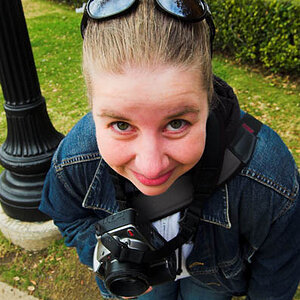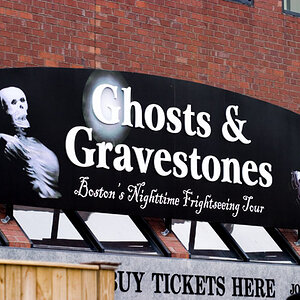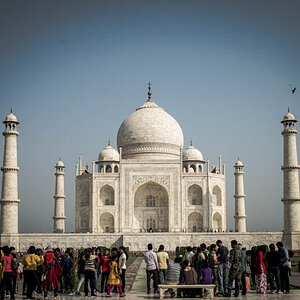Steve5D
TPF Noob!
- Joined
- May 7, 2012
- Messages
- 3,307
- Reaction score
- 1,265
- Location
- St. Augustine, Florida
- Can others edit my Photos
- Photos NOT OK to edit
I started around 2006.
But when I started shooting professionally means nothing. I learned photography on a Canon TLb. It doesn't get much more "manual" than that. Shooting professionally or not is hardly a metric to use in this discussion.
And I glazed over nothing. Just as you wanted to dismiss the "They're not at my level" answer that you would certainly inevitably get, so do you dismiss the reasons I gave for why it's better. Now, you may not like or agree with those reasons; I really don't give a rat's ass. But instead of dismissing them, perhaps you could make even a lame attempt at refuting them.
I don't know anyone who's not concerned with how much something costs. You seem to think that saving over $1,600.00 isn't a valid reason. Well, you're the only guy I know who believes that, so I'll go ahead and assume that it's you who may not be thinking straight. Just because you wouldn't think about it doesn't mean it doesn't matter. To say it doesn't matter is BS, unless you've just got so much money you don't mind pissing it away needlessly.
Then again, if you had that kinda' jack, you wouldn't be whining about wanting to take $15.00 portraits.
How about you explain how no longer dealing with those things makes photography worse?
I'll remind you, again, of the questions you asked:
To that I answered "no". You're hardly in a position to suggest that my answer should be something else, or to to suggest that my response lacks merit, but you gave it the ol' college try nonetheless.
And then you asked this:
To that I also answered "no", and you seemed to take issue with that, too.
Look, if you're having a hard time hanging in there because of the changes which the development of photography has brought about, get out. Do something else. Bartending's fun. But if you're afraid that the photographers of tomorrow aren't going to ever learn how to use a light meter to shoot portraits in the snow, get over it. Hell, I know professional photographers who've never seen seen snow.
The bottom line is that change is inevitable. People will always try to do more with less. That used to be a measure of efficiency. Now, according to you, it's something to be scorned and ridiculed.
I make my living with a digital camera. I shoot in Manual. I shoot in Auto. I get the job done. I have happy clients who pay me. They don't care if I can impress them by pushing a roll of Tri-X to 1600. That doesn't matter to them. That matters to other photographers. Once upon a time, I didn't know anything about that. Now, back then then, more experienced photographers couldn't jump on the internet and complain about photographers who knew less. So you know what one of them did? He taught me how to push a roll of Tri-X to 1600. Now, 35 years later, that's pretty much a useless little nugget of random information, and I'm hardly a better photographer because I know how to do it.
I haven't ran a roll of film through a camera since 1997. I know how to use a light meter. I know how to develop film. I know my way around a darkroom. I can drive a stick. I can do those things, but I don't have to. Rookie photographers who can get the job done without knowing the intricacies of what you and I learned 30 or 40 years ago will get the job done. You can either adapt to that, or you can walk around and complain about the new kids don't know what you know, and who will eventually overtake you because they're satisfying their clients instead of complaining about other photographers...
But when I started shooting professionally means nothing. I learned photography on a Canon TLb. It doesn't get much more "manual" than that. Shooting professionally or not is hardly a metric to use in this discussion.
And I glazed over nothing. Just as you wanted to dismiss the "They're not at my level" answer that you would certainly inevitably get, so do you dismiss the reasons I gave for why it's better. Now, you may not like or agree with those reasons; I really don't give a rat's ass. But instead of dismissing them, perhaps you could make even a lame attempt at refuting them.
I don't know anyone who's not concerned with how much something costs. You seem to think that saving over $1,600.00 isn't a valid reason. Well, you're the only guy I know who believes that, so I'll go ahead and assume that it's you who may not be thinking straight. Just because you wouldn't think about it doesn't mean it doesn't matter. To say it doesn't matter is BS, unless you've just got so much money you don't mind pissing it away needlessly.
Then again, if you had that kinda' jack, you wouldn't be whining about wanting to take $15.00 portraits.
How about you explain how no longer dealing with those things makes photography worse?
I'll remind you, again, of the questions you asked:
...does it bother any of the full time photographers on this forum, or the weekend wedding photographers that have been in it for years that everyday in spite of the huge changes that they are seeing more and more unskilled people cutting in on their business
To that I answered "no". You're hardly in a position to suggest that my answer should be something else, or to to suggest that my response lacks merit, but you gave it the ol' college try nonetheless.
And then you asked this:
Does it get frustrating or at times feel like you are wasting time trying to keep it going?
To that I also answered "no", and you seemed to take issue with that, too.
Look, if you're having a hard time hanging in there because of the changes which the development of photography has brought about, get out. Do something else. Bartending's fun. But if you're afraid that the photographers of tomorrow aren't going to ever learn how to use a light meter to shoot portraits in the snow, get over it. Hell, I know professional photographers who've never seen seen snow.
The bottom line is that change is inevitable. People will always try to do more with less. That used to be a measure of efficiency. Now, according to you, it's something to be scorned and ridiculed.
I make my living with a digital camera. I shoot in Manual. I shoot in Auto. I get the job done. I have happy clients who pay me. They don't care if I can impress them by pushing a roll of Tri-X to 1600. That doesn't matter to them. That matters to other photographers. Once upon a time, I didn't know anything about that. Now, back then then, more experienced photographers couldn't jump on the internet and complain about photographers who knew less. So you know what one of them did? He taught me how to push a roll of Tri-X to 1600. Now, 35 years later, that's pretty much a useless little nugget of random information, and I'm hardly a better photographer because I know how to do it.
I haven't ran a roll of film through a camera since 1997. I know how to use a light meter. I know how to develop film. I know my way around a darkroom. I can drive a stick. I can do those things, but I don't have to. Rookie photographers who can get the job done without knowing the intricacies of what you and I learned 30 or 40 years ago will get the job done. You can either adapt to that, or you can walk around and complain about the new kids don't know what you know, and who will eventually overtake you because they're satisfying their clients instead of complaining about other photographers...



![[No title]](/data/xfmg/thumbnail/37/37603-739c5d9b541a083a12f2f30e45ca2b7b.jpg?1619738147)









